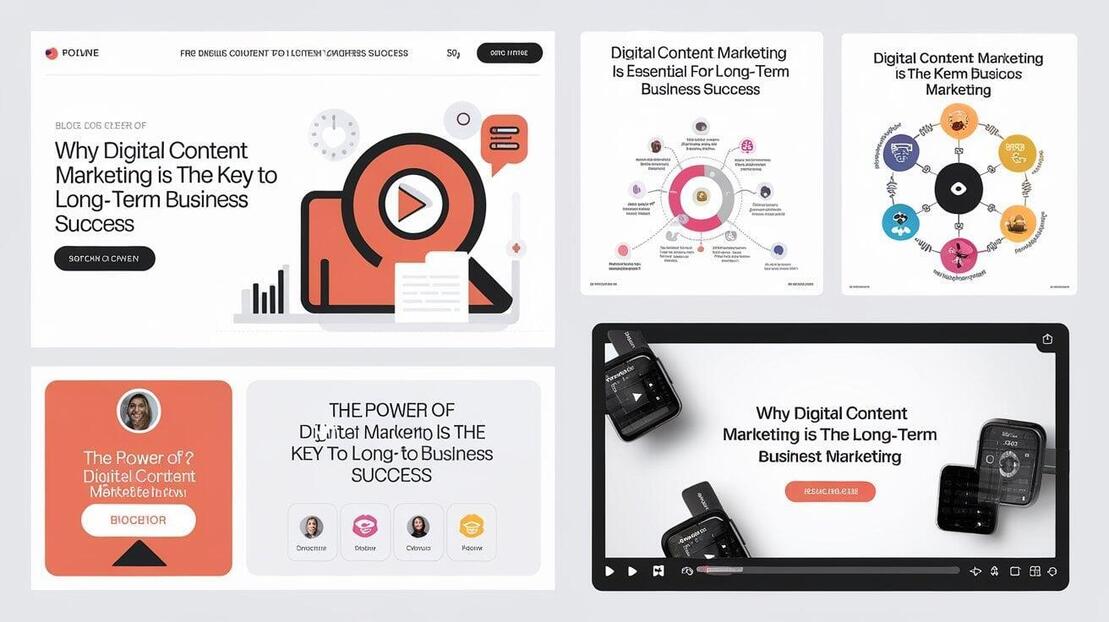Introduction
In today's digital landscape, businesses must leverage digital content marketing to stay ahead of the competition. From small startups to large corporations, content marketing has proven to be an essential strategy for sustainable growth. This article explores why digital content marketing is crucial for long-term business success, how it impacts brand visibility, customer engagement, and revenue generation.

What is Digital Content Marketing?
Digital content marketing involves creating, publishing, and distributing valuable content to attract and engage a target audience. Unlike traditional advertising, content marketing focuses on delivering relevant and informative content that builds trust and nurtures relationships with potential customers.
Common formats of digital content marketing include:
Infographics
Videos
E-books
Social media content
Podcasts
By consistently producing high-quality content, businesses can establish themselves as industry authorities and foster long-term customer loyalty.
How Digital Content Marketing Drives Long-Term Business Success
1. Enhances Brand Awareness
A well-executed digital content marketing strategy helps businesses increase their brand visibility. By publishing content on websites, social media, and third-party platforms, companies can reach a broader audience and establish brand recognition.
2. Builds Strong Customer Relationships
Consumers today prefer engaging with brands that provide informative and valuable content rather than just promotional messages. Digital content marketing fosters trust, helping businesses create a loyal customer base that leads to long-term success.
3. Improves Search Engine Rankings
Search engines favor websites with fresh, relevant, and high-quality content. By optimizing blog posts, landing pages, and other digital assets with digital content marketing best practices, businesses can rank higher on search engine results pages (SERPs), increasing organic traffic.
4. Generates Cost-Effective Leads
Compared to traditional advertising, digital content marketing is a cost-effective lead generation strategy. High-value content attracts potential customers organically, reducing the need for expensive paid promotions.
5. Boosts Conversion Rates
Well-structured and engaging content persuades visitors to take action—whether it’s signing up for a newsletter, downloading a free resource, or making a purchase. Businesses that implement strategic digital content marketing techniques often see higher conversion rates.
6. Establishes Industry Authority
Publishing insightful, data-driven content positions a brand as an industry leader. Companies that consistently produce thought leadership articles and research-backed content gain credibility, influencing customer purchasing decisions.
7. Supports Omnichannel Marketing Efforts
A solid digital content marketing strategy integrates seamlessly across multiple channels, including websites, social media, email, and paid ads. This ensures a cohesive brand message that resonates with diverse audiences.
Best Practices for a Successful Digital Content Marketing Strategy
1. Define Your Target Audience
Understanding the needs, preferences, and pain points of your audience is critical. Creating detailed buyer personas helps tailor content to address specific customer concerns.
2. Develop a Content Calendar
Consistency is key in digital content marketing. A well-planned content calendar ensures regular content publication, keeping audiences engaged and search engines satisfied.
3. Optimize for SEO
Incorporate relevant keywords, optimize meta tags, use internal linking, and format content properly to enhance search engine rankings. Avoid keyword stuffing and focus on delivering valuable content.
4. Leverage Multiple Content Formats
Diversify your digital content marketing efforts by using a mix of blog posts, videos, podcasts, and infographics to cater to different audience preferences.
5. Monitor Performance and Adapt
Use analytics tools like Google Analytics and RankMath to track content performance. Regularly updating and repurposing content based on performance data ensures long-term success.
Conclusion
In a fast-paced digital world, digital content marketing is not just a trend but a necessity for businesses aiming for long-term success. By enhancing brand awareness, improving search rankings, generating leads, and establishing authority, content marketing remains a powerful tool for sustainable growth. Companies that embrace this strategy will thrive in an increasingly competitive market.
